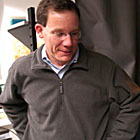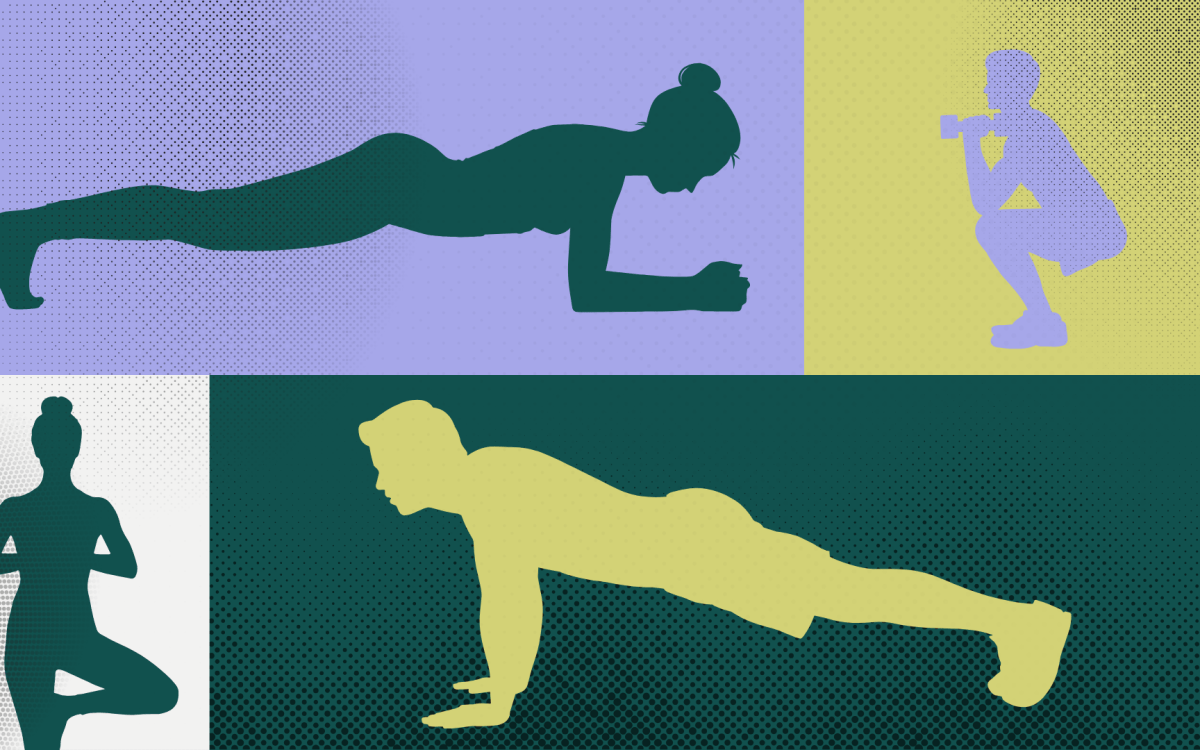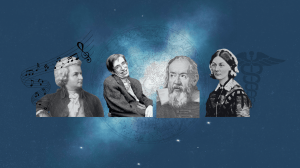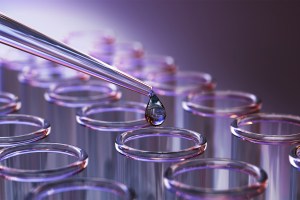Tag: Science
-
Health
Field school brings students to Borneo
Morning came in the middle of the night in the hikers’ hut partway up the side of Borneo’s towering Mount Kinabalu.
-
Health
Nanowire makes own electricity
Harvard chemists have built a new wire out of photosensitive materials that is hundreds of times smaller than a human hair. The wire not only carries electricity to be used in vanishingly small circuits, but generates power as well.

-
Campus & Community
Frankel receives Lennart Nilsson Award for science photography
Felice Frankel, scientific imagist and researcher in Harvard’s Initiative in Innovative Computing, has been named the recipient of the 2007 Lennart Nilsson Award for scientific or nature photography. Frankel was cited for creating images described by Sweden’s Karolinska Institute, which oversees the award, as “exquisite works of art and crystal-clear scientific photographs — both fascinating…
-
Campus & Community
Junior faculty, clinicians receive Shore Fellowships
The Eleanor and Miles Shore 50th Anniversary Fellowship Program for Scholars in Medicine has announced the selection of more than 90 junior faculty members, researchers, and clinicians as fellows for the 2007-08 academic year. Fellows generally receive between $25,000 and $30,000 for one year.
-
Campus & Community
Shore Fellows awarded valuable time
N. Stuart Harris, an emergency physician at Massachusetts General Hospital, is also an active researcher doing groundbreaking research on hypoxia — a shortage of oxygen in the body.
-
Health
Researchers better understand biological clock
Researchers at Harvard University and the Howard Hughes Medical Institute (HHMI) have discovered that a simple circadian clock found in some bacteria operates by the rhythmic addition and subtraction of phosphate groups at two key locations on a single protein. This phosphate pattern is influenced by two other proteins, driving phosphorylation to oscillate according to…
-
Nation & World
How Sputnik changed U.S. education
Education experts said Oct. 4 that the United States may be overdue for a science education overhaul like the one undertaken after the Soviet Union launched the Sputnik satellite 50 years ago, and predicted that a window for change may open as the Iraq war winds down.
-
Health
Mahzarin Banaji looks at biology of bias
Mahzarin R. Banaji, a Harvard social psychologist, studies how people think, and how they think they relate to one another. She’s an expert in the little secrets we all have: those implicit attitudes — sometimes prejudicial — regarding race, age, gender, and similar territories of otherness.
-
Health
Biologists remember landmark theory
Forty years ago, Edward O. Wilson and Robert H. MacArthur described how size and isolation determine how many species an island can support. Last week, biologists gathered to mark the theory’s anniversary, calling it a “pivotal point” in ecology’s relatively short history.
-
Arts & Culture
Harvey Mansfield on politics, the humanities, and science
Harvey Mansfield wants to reintroduce the concept of thumos into political science. As employed by Plato and Aristotle, thumos refers to the “part of the soul that makes us want to insist on our own importance.” Mansfield believes that modern political science has excluded thumos, and as a result has narrowed its understanding of what…
-
Health
At HMOs, Medicaid patients fare worse than others
Once viewed as a panacea to the nation’s health care problems, HMOs have fallen out of favor. Commercially insured patients who flooded into HMOs, or managed care, in the early 1990s left in droves by the end of the decade. Medicaid patients, however, don’t always have the luxury of choosing their health plans, and the…
-
Campus & Community
Taking distance education to the next level
A major advance in distance education was initiated this fall in a specially equipped classroom at the Harvard Extension School. Classes held there give online students the ability to view on-campus lectures in real-time and actually take part in classroom discussions. The facility also serves as an experimental locus to test distance education teaching methods…
-
Health
‘Speed limit’ found on rate of evolution
Harvard University scientists have identified a virtual “speed limit” on the rate of molecular evolution in organisms, and the magic number appears to be six mutations per genome per generation — a rate of change beyond which species run the strong risk of extinction as their genomes lose stability.
-
Science & Tech
Ancient practice sans theory
Move over, Archimedes. A researcher at Harvard University is finding that ancient Greek craftsmen were able to engineer sophisticated machines without necessarily understanding the mathematical theory behind their construction.
-
Health
Stem Cell Summit draws 500 participants
Massachusetts Gov. Deval Patrick Wed-nesday (Oct. 3) called on those attending the second day of a Harvard Stem Cell Institute (HSCI)-sponsored Stem Cell Summit to support his proposed $1 billion life sciences initiative “so we can get partnering with you.”
-
Campus & Community
Chili pepper cocktail points to wide-awake surgery
Imagine an epidural or a shot of Novocain that doesn’t paralyze your legs or make you numb yet totally blocks your pain. This type of pain management is now within reach. As a result, childbirth, surgery, and trips to the dentist might be less traumatic in the future, thanks to researchers at Massachusetts General Hospital…
-
Health
Research links panic and heart attack in older women
New research has linked panic attacks in older women with an increased risk of heart attack, stroke, and death from all causes, adding panic attacks to the growing list of mental and emotional conditions with potentially deadly physical effects.
-
Campus & Community
American Indians bless search for Harvard roots
With a ceremonial blessing and a cautionary reminder of native peoples’ historic oppression, a group of American Indian leaders joined an assemblage of experienced and budding archaeologists Wednesday (Sept. 26) to begin the search for Harvard’s Indian College roots.
-
Campus & Community
Newsmakers
In August, the Rev. Professor Peter J. Gomes, the Plummer Professor of Christian Morals and Pusey Minister in the Memorial Church, was appointed by Queen Elizabeth II to membership in The Most Venerable Order of the Hospital of St. John of Jerusalem, the oldest order of chivalry in the United Kingdom, dating to the 10th…
-
Health
Harvard researchers find longevity, restricted diet link
Researchers believe they’ve found the cellular link between extremely restricted diets and dramatically lengthened lifespan and hope to use the knowledge to develop new treatments for age-related diseases.
-
Campus & Community
Harvard christens School of Engineering and Applied Sciences
An afternoon of reflection, promise, and a bit of humor marked the official launch of the Harvard School of Engineering and Applied Sciences on Thursday (Sept. 20), the first new Harvard school since the John F. Kennedy School of Government was created 71 years ago as the Graduate School of Public Administration.
-
Science & Tech
Digging for solutions to energy crisis
In the 1970s, Iceland was one of the poorest countries in Europe. Today it is one of the richest, with a per capita GDP higher than that of Denmark, from which it won full independence in 1944.
-
Health
Scientists synthesize memory in yeast cells
Harvard Medical School (HMS) researchers have successfully synthesized a DNA-based memory loop in yeast cells, an experiment that marks a significant step forward in the emerging field of synthetic biology.
-
Campus & Community
Harvard to limit greenhouse gas emissions in new Allston construction
Harvard University this week reiterated its long-standing commitment to improving the environment, voluntarily agreeing to limit greenhouse gas emissions from new buildings constructed on its Allston campus in ways that…
-
Campus & Community
In Brief
The bequest of William F. Milton makes research funds available to faculty members of Harvard University. The Radcliffe Institute for Advanced Study has announced several upcoming events, including panel discussions, lectures, and exhibits. Members of the Harvard community are invited to join in the first University-Wide Day of Service on Sept. 29.
-
Campus & Community
Newsmakers
Harvard affiliates receive ACLS Fellowships Professor Pilbeam to serve as interim dean of College Hanyang University honors Howard Gardner Hedley-Whyte honored by ISO Polish Academy elects Sevcenko Young scientist Amy Wagers wins distinguished award Nieman names narrative director Professors share Gruber prize
-
Campus & Community
School of Design names Loeb fellowship class for 2007-08
The following midcareer practitioners, whose work is dedicated to the improvement of the built and natural environment, will be in residence as Loeb Fellows at the Harvard Graduate School of Design (GSD) for the upcoming academic year.
-
Health
Stem cells make new heart valves
Researchers have coaxed adult stem cells into forming artificial heart valves that could one day mean fewer surgeries for children suffering from heart defects.
-
Campus & Community
Mathematician Taylor wins Shaw Prize
Herchel Smith Professor of Mathematics Richard Taylor has been awarded the Shaw Prize in Mathematical Sciences for work that unified the diverse fields of prime numbers and symmetry. Taylor shares…


